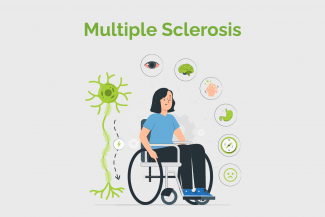
Multiple sclerosis (MS) is a formidable neurological adversary, impacting countless lives with its unpredictable course. Yet, the relentless pursuit of medical innovation offers a beacon of hope. Today's treatment landscape is a testament to this progress, providing a suite of options that promise a better quality of life for those affected.
Decoding Multiple Sclerosis
MS is an autoimmune onslaught against the central nervous system, where the immune system mistakenly attacks myelin, the protective layer encasing nerve fibers. This results in a myriad of neurological symptoms, potentially robbing individuals of their vision, speech, or mobility.
While the precise cause of MS eludes us, it's believed to be a complex interplay of genetic and environmental factors. Delving into the pathophysiology of MS is key to understanding the mechanisms behind the treatments.
The Treatment Panorama
The cornerstone of MS management lies in Disease-Modifying Therapies (DMTs). These agents are tailored to diminish the frequency and intensity of MS flare-ups, decelerate disease progression, and alleviate symptoms. Notable DMTs include interferon beta-1a and beta-1b, glatiramer acetate, dimethyl fumarate, fingolimod, and natalizumab, each chosen based on the individual's disease characteristics and health profile.
Corticosteroids like methylprednisolone serve as the cavalry during MS attacks, mitigating inflammation and curtailing attack duration.
Symptom-specific medications also play a pivotal role, addressing muscle spasms, pain, and fatigue, thus improving daily functioning.
The Dawn of New Therapies
The MS therapeutic domain is witnessing a renaissance with the advent of novel DMTs and the promise of stem cell therapies. These cutting-edge treatments aspire to not only arrest the disease's progression but also to reverse the damage inflicted.
Autologous hematopoietic stem cell transplantation (AHSCT) is a beacon of hope in this new era. This procedure involves harvesting the patient's own stem cells, resetting the immune system through chemotherapy, and then reintroducing the stem cells to forge a rejuvenated, disease-resistant immune system.
While still in the experimental phase, early trials of AHSCT have shown encouraging outcomes, igniting hope for a future where MS can be put into remission.
Tailoring Treatment to the Individual
The paradigm of personalized medicine is reshaping MS treatment, taking into account the unique disease trajectory, lifestyle, and comorbidities of each patient. Genetic testing and biomarkers are increasingly guiding these bespoke treatment strategies.
The Power of Lifestyle Interventions
Beyond pharmacological interventions, lifestyle modifications and complementary therapies are gaining recognition for their role in MS management. A balanced diet, regular exercise, stress management, and smoking cessation are all pillars supporting the edifice of MS care.
Vitamin D supplementation and sun exposure are often advocated, given the vitamin's link to MS risk and symptom severity.
Therapeutic and Complementary Approaches
Physical therapy remains a mainstay, enhancing mobility and strength, while complementary practices like acupuncture and yoga offer additional avenues for symptom relief.
The Importance of Support and Knowledge
The journey through MS is one best traveled with support. Healthcare professionals, loved ones, and support groups provide invaluable assistance, while educational resources empower patients and caregivers with knowledge.
Charting the Path Forward
The quest for effective MS treatments is an ongoing odyssey, with clinical trials and research continually unveiling new possibilities. Staying informed about these developments is crucial for those seeking to manage MS proactively.
In summary, the most effective treatments for MS are those that are personalized, current, and bolstered by a robust support network. As the medical community advances, so too does the hope for those living with MS, illuminating a path toward managing the disease with confidence and optimism.




